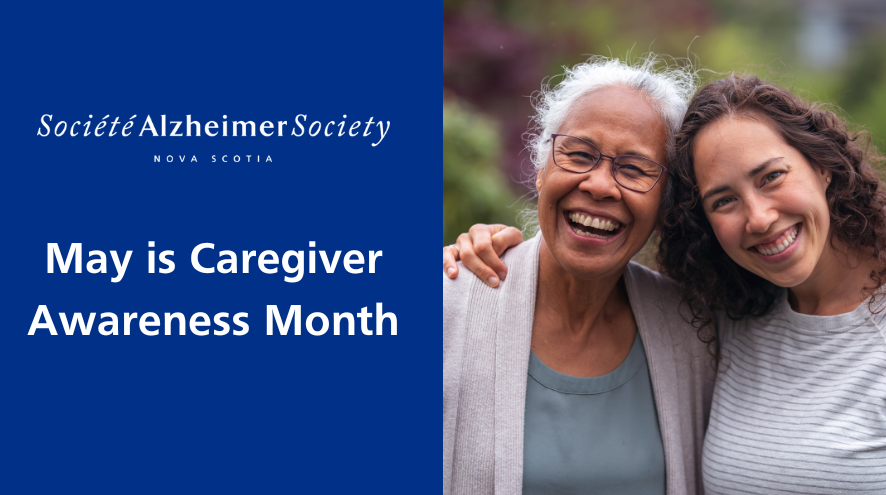May is Caregiver Awareness Month

May is Caregiver Awareness Month across Canada. It is an opportunity to acknowledge the contributions of thousands of Canadians who partner with and provide care to family and friends. It is likely that you know a care partner, or you may be one yourself.
How many people are performing the vital work of care partners? Here are the facts:
- One in four Canadians is a caregiver.
- In 2020, there were 350,000 care partners supporting people living with dementia.
- By 2050 this number is projected to nearly triple with an increase to over one million care partners in Canada.
You may have heard dementia referred to as a women’s issue. This is not unfounded. Around twice as many women as men are diagnosed with Alzheimer’s disease, and although both men and women provide care, statistics show that women do most of the unpaid caregiving for people living with dementia. Also, more than half of care partners are adult children and nearly one-third are spouses between the ages of 45 and 65. Known as the sandwich generation, many women provide care to parents while also working and caring for children which can lead to feelings of overwhelm.
Did you know that a care partner spends on average 26 hours a week providing care? Care partners provide support with a range of day-to-day activities. They help with household chores, provide personal care, navigate health care needs, and provide companionship to the person they care for.
As a result of these 26 hours a week spent on caregiving (the equivalent of a part-time job), women often step away from the paid workforce, missing career opportunities and putting their own financial security at risk. They may also spend less time with their friends and social networks.
While many individuals find caregiving to be a very rewarding experience, it can also be stressful at times. Caregiving stress can negatively impact the physical and emotional health of care partners and their quality of life. Because of the potential impacts of caregiving on women, it is important that programs and services be designed with a sex and gender-based lens.
Canada has a very diverse aging population. Dementia does not discriminate and as a result, we are seeing an increase in care partners from a broad range of backgrounds. In addition to the differential impact of caregiving on women, the caregiver experience varies widely across these many other communities. Racialized caregivers are more likely to care for family members other than parents or a spouse such as grandparents, aunts and uncles.
Caregivers in rural areas also face distinct challenges. More research is needed to ensure appropriate programs and services are available to meet the unique needs of care partners in diverse and equity-deserving communities.
As the number of people living with dementia and the people caring for them will only continue to increase in the coming years, it is crucial that we find ways to better support and alleviate the demands placed on care partners. Everyone has a role to play.
What can you do? Here are a few suggestions:
- Support care partners within your families and social networks. Offer to run errands or make a meal.
- Increase your awareness of dementia and how it impacts care partners.
- Advocate for your community to become dementia-friendly to reduce stigma and isolation that impacts care partners and people living with dementia.
- Improve your own brain health and take measures to reduce your risk.
We are here to support care partners. In fact, recent data indicates that more than 90% of the calls to the Dementia Helpline in the past year were from care partners of people living with dementia and more than 75% were from women.
We also have other programs and services including caregiver support groups and the Caregiver Education Series. Among the many organizations who support caregivers in Nova Scotia, we’re proud to collaborate with Caregivers NS. They provide programs and services for friends and family members giving care across Nova Scotia. Visit their website at www.caregiversns.org.
If you are a care partner, reach out for help. You are not alone. Call us at 1-800-611-6345 or visit the links on this page to learn more.
